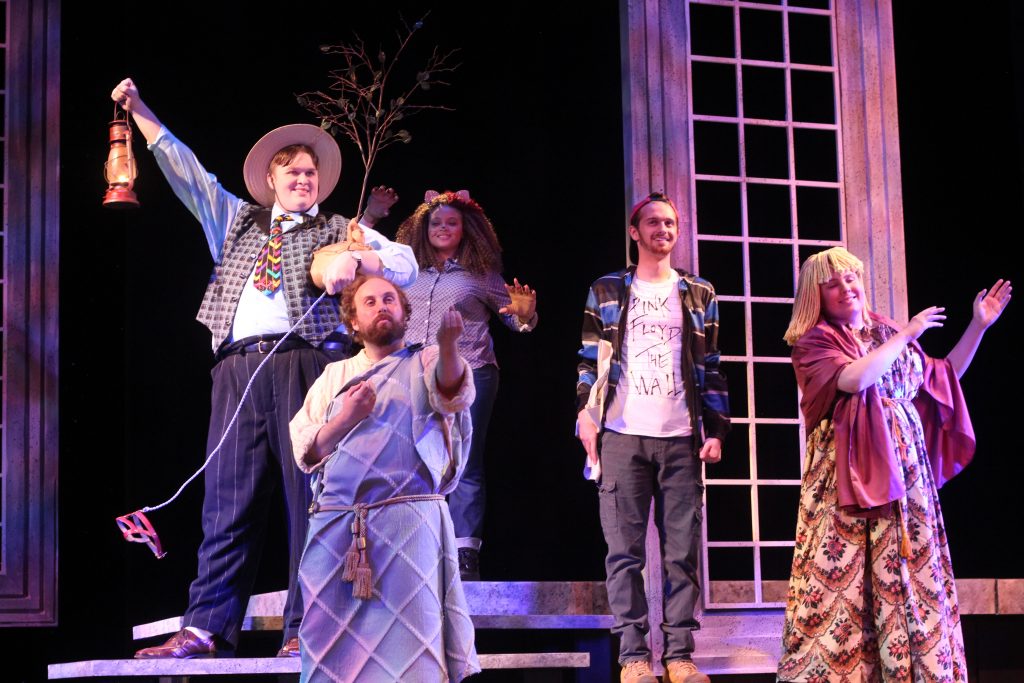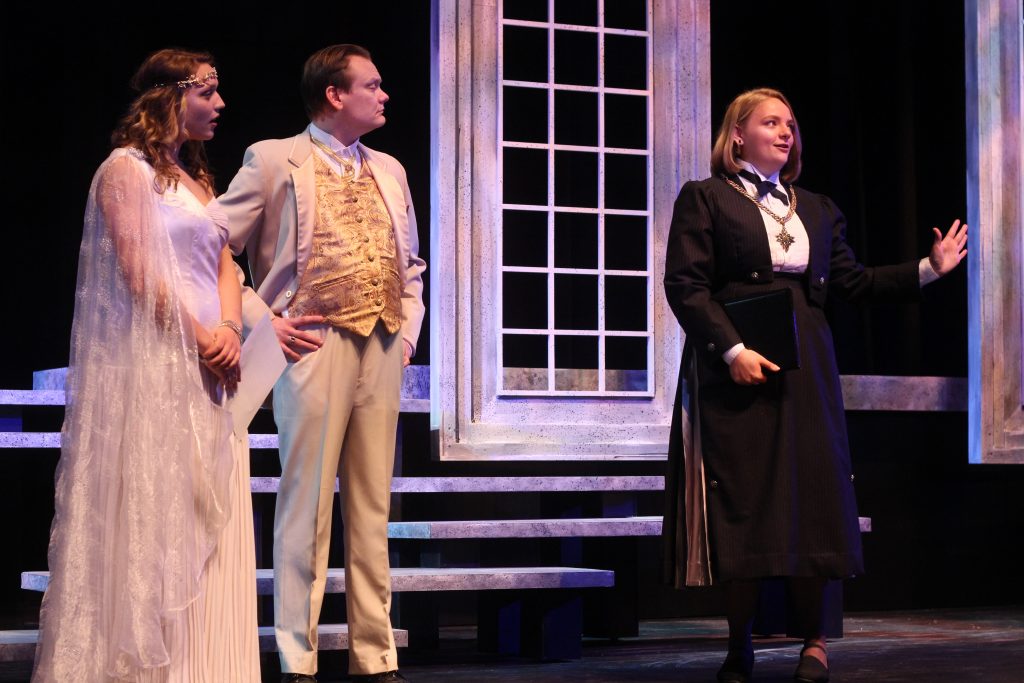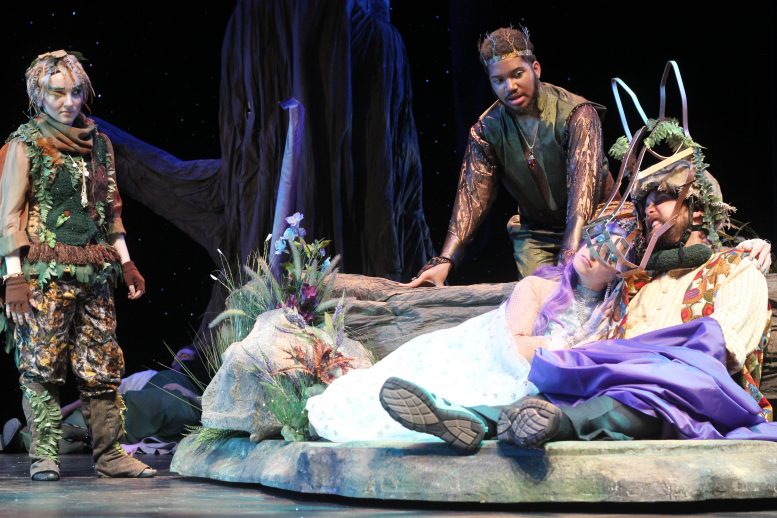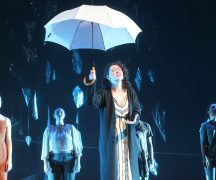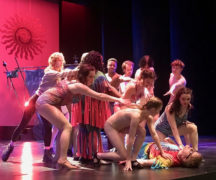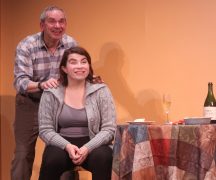By DAVID DUPONT
BG Independent News
“A Midsummer Night’s Dream” is Shakespeare’s most staged play. The production of the fantastical comedy at Bowling Green State University shows why. In 525 years, the magic still hasn’t worn off. “Midsummer” still glows, and offers plenty of room for interpretation. Most importantly, it is still funny, in so many ways.
“A Midsummer’s Night Dream” opens tonight (Thursday, May 2) at 8 p.m. in the Donnell Theater in the Wolfe Center for the Arts. The Department of Theatre and Film production continues Friday and Saturday at 8 p.m. with matinees Saturday and Sunday at 2 p.m. Tickets are $15 in advance and $20 at the door.
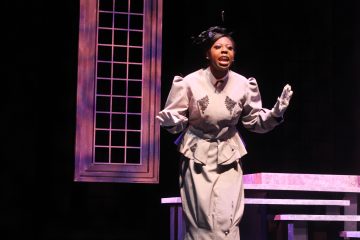
The comedy unfolds on four levels. In this production directed by Heidi Nees those levels are as clear as those in an iridescent layered cocktails — each ingredient in its space, and yet together they combine for an intoxicating brew.
First, we have the frame story of Theseus (Dan Cullen), the king of Athens’ impending nuptials to Hippolyta (Talisa Lilli Lemke). The Queen of the Amazons is less than thrilled with the marriage, given she is essentially the spoils of war, literally a trophy wife.
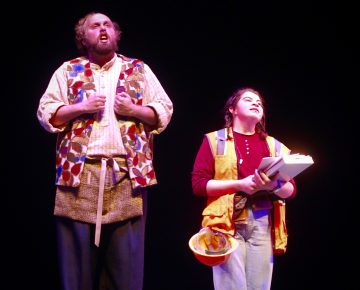
Nees extends this plot line by having the characters play out in mime scenes of the royal couple making arrangements for their ceremony with Megan Kome as Philostrate acting as the wedding planner. We get to see the royal couple grow closer as Hippolyta takes a greater hand in the plans.
Their preparations are disrupted by a dispute between Egeus (Harmon Andrews) and his daughter Hermia (Anna Randazzo).
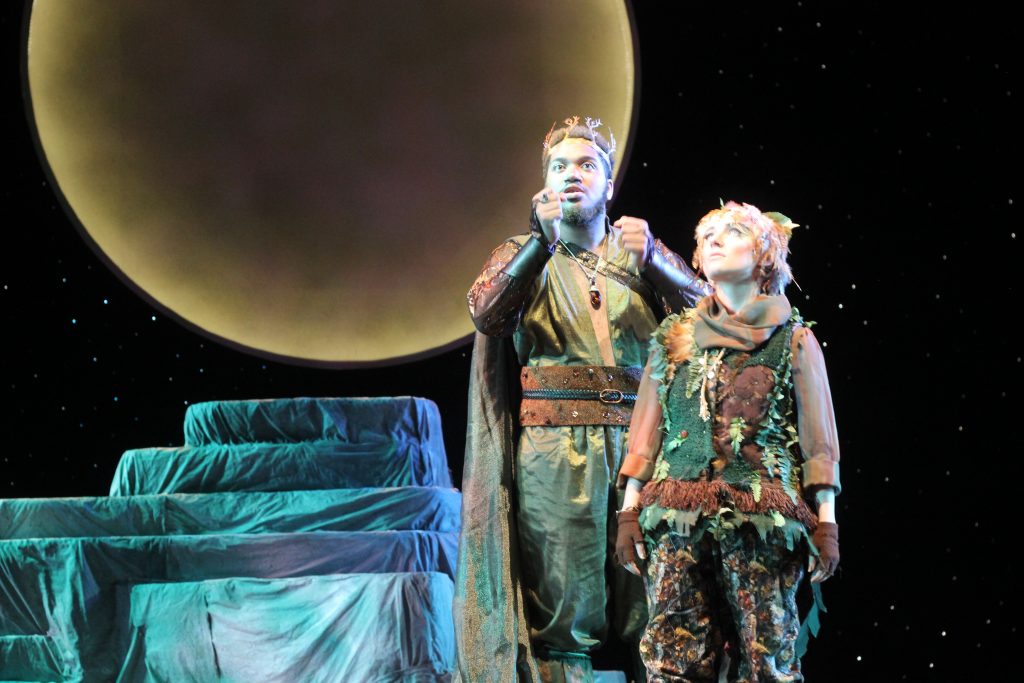
He has arranged for her to marry Demetrius (Zachary Davis), but she’s surrendered her heart to Lysander (Anna Thompson). This bit of reverse gender casting works. Thompson is sparkling as Lysander, and she and Randazzo have true romantic chemistry.
White, for her part, plays Hermia less as the virtuous ingenue, and more as a slightly ditzy love interest.
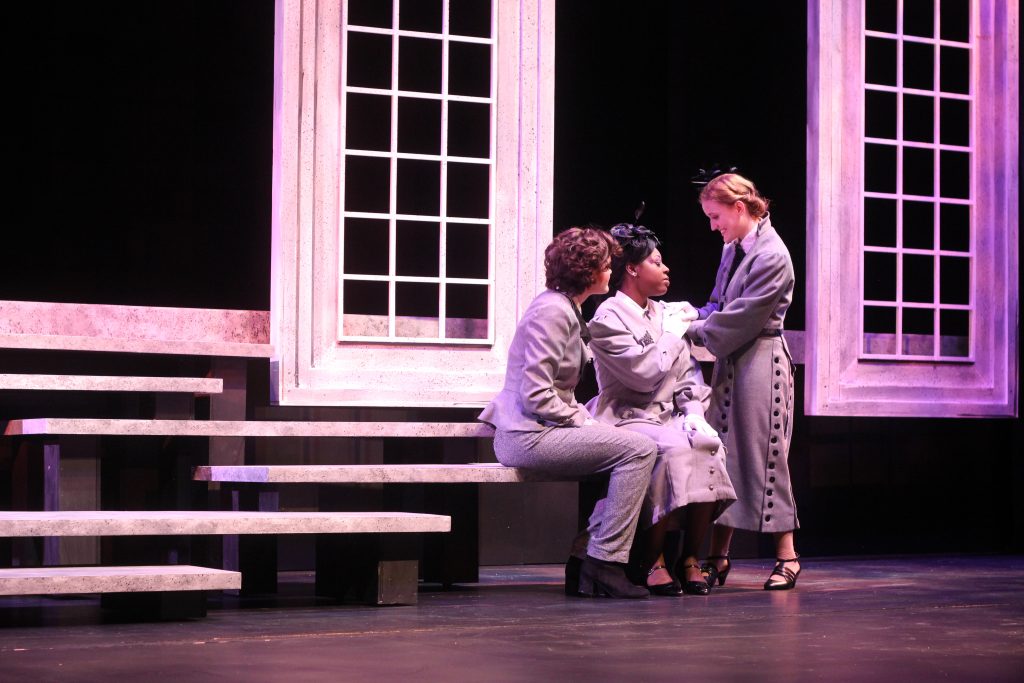
When she and Lysander arrange to run away together, she unleashes a string of analogies to profess how true her vow is. With each reference to Cupid or Venus, she seems to be joyfully topping herself, all to comic effect. Not a place you’d expect to laugh, but comedy is in the forefront here, both the laughs inherent in the Bard’s words, and in humor projected by the gestures of the actors.
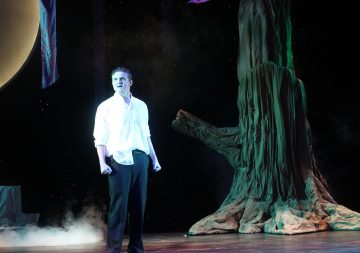
The couple must flee because if Hermia doesn’t marry Demetrius she faces either death or life in a convent. Or as Theseus describes it: “To live a barren sister all your life, Chanting faint hymns to the cold fruitless moon.”
Helena (Sherry White) is in love with Demetrius who had earlier led her on, and on learning of the flight plans of Lysander and her childhood friend Hermia, she tells him. She seeks to ingratiate herself to him and effect a rift between him and Hermia.
This doesn’t work, because Demetrius is a cad, a quality Davis brings out whenever he’s on stage.
So these lovers head into the enchanted wood where they step into a dispute between the fairy royalty Oberon (Coniyah McKinney) and Titania (Kayleigh Hahn). The officious Oberon wishes to teach Titania a lesson and enlists the trickster Puck (Anna Parchem).
Puck moves easily between the world of humans and the invisible fairy realm. With its gigantic moon, the set brings the fantastical forest alive.
Parchem is agile and wily as Puck, exuding great joy whenever she has the chance to exercise mischief on someone, and not all that concerned when it is misdirected. She has plenty of creatures to prank.
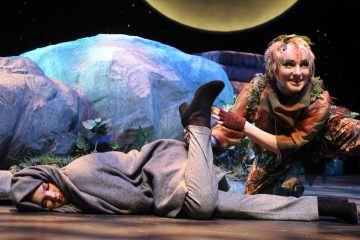
She comes upon a group of “rude mechanicals,” tradespeople from the city preparing a play to stage for the royal nuptials. Think of this as proto-community theater, except this crew is far more bumbling than what we now expect.
They are led by Quince (Kelly Dunn), but it is Bottom (David Loehr) who takes center stage. He steps up with unwanted suggestions, including that he play both the male and females roles. That he’s overridden by the long-suffering Quince doesn’t stop him.
The others — Snug (Janae Anderson), Snout (Brian Farstvedt), Flute (Michael Cuschieri), and Starveling (Cameron Endly) — are sometimes convinced, sometimes annoyed by Bottom and his overbearing ways. While Quince may be the guiding light of the troupe, Bottom is its inspiration.
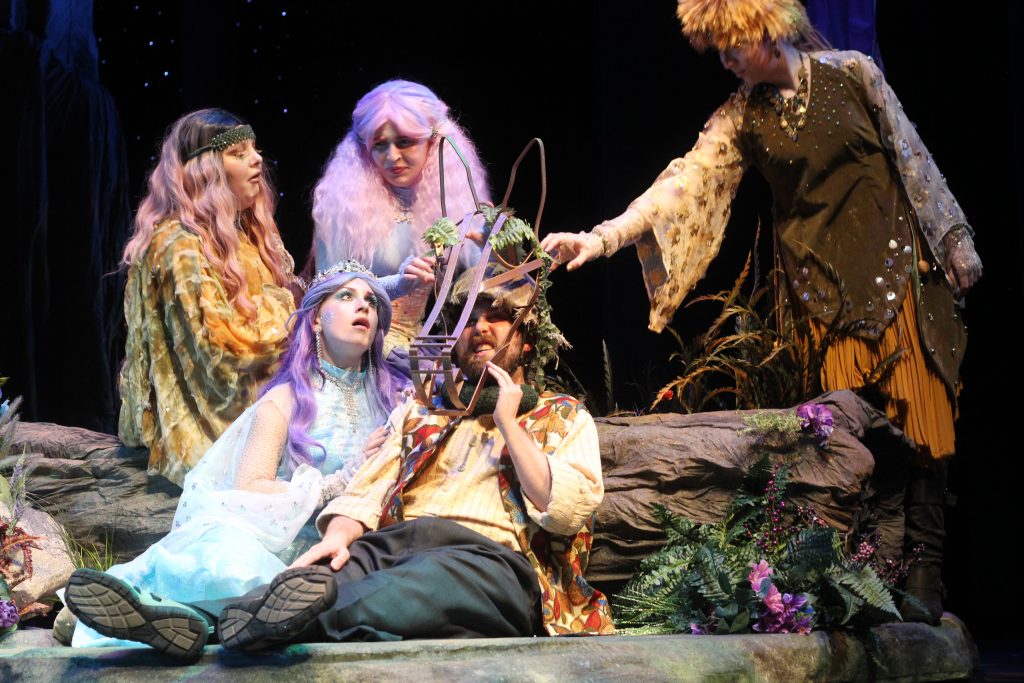
They go to the forest to rehearse in secret, and when Bottom exits at the end of his scene, Puck goes to work, giving him a donkey’s head,. That leads to countless plays on the word “ass.”
Puck is on a mission to have Titania make an ass of herself. Oberon orders Puck to enchant Titania with a magic flower. This will make her fall in love with the first person she sees upon waking. And that creature is Bottom.
As she dotes on the donkey-headed fool, her court — Peaseblossom (Lorna Jane Patterson), Cobweb (Mikey Ragusa), Mustardseed (Shannon Bingham), and Moth (Stephanie Christopher) — must wait upon him.
Puck is also instructed to apply the same magic to Demetrius’ eyes so he falls in love with Helena, except the spell is cast on Lysander instead. When Puck then also does the trick on Demetrius, Helena goes from being unwanted to being pursued by two lovers.
She believes this is a cruel trick. The lovely Hermia is now scorned by both Lysander and Demetrius, and her old friend, who thinks she’s in on this deception.
This circle of romantic confusion plays out until magic is reversed by Oberon, and all couples are properly aligned.
Helena becomes aware of the magic, and as she follows Demetrius off at play’s end, she glances down at the magic flower and nestles it.
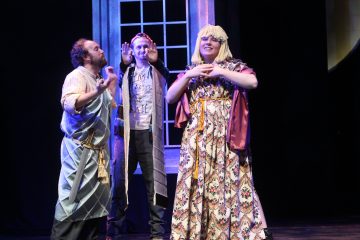
This comes after the rude mechanicals get a chance to perform for the amusement of the three newly married couples. That amusement is mostly at the expense of the players rather than a response to their ham-handed theatrical efforts.
But in the end when Flute as Thisby cries over the body of her lover Pyramus, the couples, even Demetrius, are moved.
That’s a fitting tribute to the power of theater, even as presented by “rude mechanicals.”
This “Midsummer Night’s Dream” elicits only tears of laughter, and smiles to be reminded about the magic that can happen on a stage.
